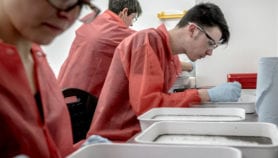Send to a friend
The details you provide on this page will not be used to send unsolicited email, and will not be sold to a 3rd party. See privacy policy.
[CAPE TOWN] South Africa’s science and technology minister, Mosibudi Mangena, has launched an ambitious policy for the country’s biotechnology development. The document outlines key areas of focus as well as the technologies needed for the plan to succeed.
Biotechnology platforms: strategic review and forecast identifies the main beneficiaries of advances in biotechnology as health services, agriculture, industry, mining and the environment.
But implementing this biotechnology ‘roadmap’ will require significant advances in genomics, transgenics, cell and tissue culture as well as the so-called ‘process and product’ technologies, such as diagnostic, analytical and manufacturing technologies and bioinformatics.
The policy calls for the establishment of world-class genomics capability, with at least one national facility and a number of centres of excellence. It also emphasises the need to develop cell and tissue culture technologies, such as cloning, stem cell research, plant tissue culture and gene banks.
It envisions transgenics, the transfer of genes between species, developing from a general laboratory technique into a field capable of generating globally competitive products and processes. And it proposes that a few major projects in this field with a strong chance of success should be prioritised for funding.
Mangena also identifies needs related to research infrastructure for the design, testing and manufacture of drugs and vaccines. Among these are improved biosensors, particularly those designed to monitor metabolite levels in humans and animals, and bioassays to identify compounds in screening programmes. Beyond physical needs such as ‘clean room’ technology needed for high-tech electronics and materials science research, and bioreactor design, he calls for better manufacturing practices.
The report adds that South Africa must also promote human resource development and develop greater awareness of the need for and potential of bioinformatics — the application of computer analysis to biological research.
The government adopted a national biotechnology strategy in 2001, committing an initial R450 million (US$69 million) from 2004 to 2007 to biotechnology development. The strategy highlighted the importance of a ‘bioeconomy’ and the new policy reiterates this, calling for the development of commercially viable biotechnology products.
Although South Africa has been involved in biotechnology research and development for more than 30 years, and biotechnologies are used in industrial sectors such as food and beverages and wastewater treatment, commercialisation in the field is limited.
A flourishing biotechnology industry depends in large part on investment, and the document recommends that to attract it, stakeholders in government, research and academic institutions, and industry will need to form strategic partnerships.
Ben Durham, head of biotechnology in the government’s science and technology department, says the next step will be to distribute the report widely within industry to encourage consideration of biotechnology opportunities.
Durham adds that the policy will also build on and take forward existing initiatives, such as South Africa’s new biotechnology regional innovation centres, the national bioinformatics network and the programme on the public understanding of bioinformatics.













